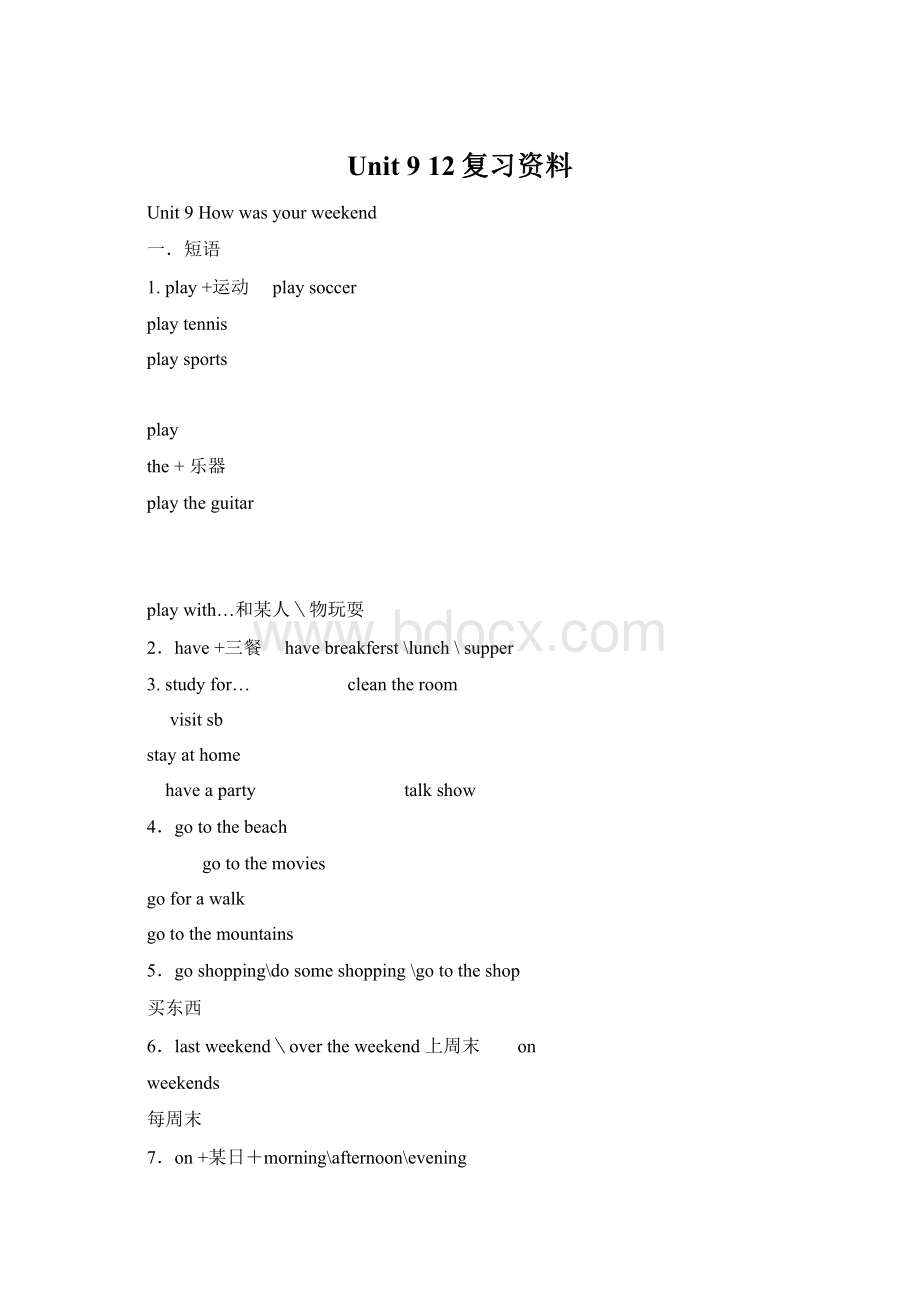Unit 9 12复习资料文档格式.docx
《Unit 9 12复习资料文档格式.docx》由会员分享,可在线阅读,更多相关《Unit 9 12复习资料文档格式.docx(12页珍藏版)》请在冰豆网上搜索。

Hewasathomeyesterday.
否定句:
Hewasn’tathomeyesterday.
疑问句:
Washeathomeyesterday?
Yes,hewas./No,hewasn’t.
(2)行为动词的一般过去时:
主语+动词过去式+其它
Igotothemovie.→Iwenttothemovie.
主语+助动词didn’t+动词原形+其它
Idon’tgotoschooltoday.→Ididn’tgotoschool.
一般疑问句:
Did+主语+动词原形+其它
Doyouhavebreakfast?
→Didyouhavebreakfast?
Yes,Ido./No,Idon’t.
Yes,Idid./No,Ididn’t.
(3)规则动词的过去式变化规则
变化规则例词
一般在词尾加—ed.
play→played
以不发音的e结尾的,只加--d.
like→liked
love→loved
以辅音字母+y结尾的,变y为i,再加—ed.
study→studied
carry→carried
以一个辅音字母结尾的重读闭音节,先双写这个辅音字母,再加-ed
stop→stopped
plan→planned
动词不规则变化:
do→did
have→had
go→went
see→saw
read→read
get→got
give→gave
sleep→slept
eat→ate
write→wrote
find_---found
2.
what’sthedatetoday?
It’s…
3.
Whatwasthedateyesterday?
Itwas…
4.
What’stheweatherliketoday?
It’s…?
5.
Howwasyourweekend?
6.Whatdidshedo?
Shedidherhomework
7.Whatdidhedolastweekend?
Heplayedsoccer
8..It’stimetogohome=It’stimeforhome
Unit10Wheredidyougoonvacation?
1.goonvacation gotosummercamp stayathome
studyforexams CentralPark showsthtosb
.helphimfindhisfather walkbackto… goshopping
thePalaceMuseum thinkof havefundoingsth
.bustrip theGreatWall Tian’anMenSquare
.aBeijingHutong makesbdosth
.decidetodosth allday
二.重点句子和注意事项
1.Wheredidyougoonvacation?
Iwenttosummercamp.
Wheredidtheygoonvacation?
TheywenttoNewYorkCity.
Wheredidhegoonvacation?
Hestayedathome.
Wheredidshegoonvacation?
Shevisitedheruncle.
2.
Didyou/he/she/theygotoCentralPark?
Yes,I/he/she/theydid.
No,I/he/she/theydidn’t.
3.
Howwere
themovies?
Theywerefantastic
4.
havefundoingsomething 干某事有乐趣
= enjoyoneselfdoingsomething
WehavefunlearningandspeakingEnglish.
WeenjoyourselveslearningandspeakingEnglish.
我们学英语有很多乐趣 .
5.
findsb.doingsth.发现某人在干某事 findsb.dosth.发现某人干过某事
Ifindhimreadingthenovel(小说).
Ifoundhimgointotheroom.
6.
corner 角落,角,拐角处
inthecorner在角落里(指在建筑物里面)
atthecorner在拐角处(指在建筑物外面或道路的拐角)
Mybikeisatthecorner.
7.
belost迷路了=getlost,lost(adj.)
Thegirlwaslostinthebigcity.
8.
helpsb.(to)dosth.=helpsbforsth
帮助某人干某事
HealwayshelpsuslearnEnglish
makesb.dosth.让/使某人干某事
let/havesb.dosth.
do前不带to
Themoviemakesmerelaxing.
Lettheboydohishomeworkalone.
10.
feel+adj. 感到...
Ifeelhungry/tired/happy/excited
11.
decidetodosth.决定干某事
TheydecidedtogotoHainanonvacation.
Uint11Whatdoyouthinkofgameshows?
一.词组
1..TVshows(电视节目)
soapopera sitcom acomedy anactionmovie adocumentary athriller cartoon BeijingOpera
AnimalWorld Tellitlikeitis LawToday gameshow
CCTVNews Newsin30Minutes ManandNature
ChineseCooking AroundChina talkshow Lucky52
Sportsnews sportsshow CultureChina
2.writeanarticlefortheschoolmagazine.给学校杂志写一篇文章
3.athirteen-year-oldboy.一个十三岁的男孩
4.wearcolorfulclothes.穿着颜色鲜艳的衣服
5.interviewsb.采访某人 infact.实际上
6.wearscarves.戴着围巾 thinkof想起,考虑到
二.重点句型
1.Whatdoyouthinkofsoapoperas?
Ican'
tstandthem.
2.Whatdoyouthinkofsportsshows?
Idon'
tmindthem.
3.Whatdoesshethinkof"
HilltopHigh"
?
Shedoesn'
tlikeit.
4.WhatdoesTonythinkofTommy?
Helikeshim.
5.WhatdotheythinkofAmanda?
Theyloveher.
三.重难点解析
1.wear(v.动词)"
穿,戴,佩"
。
根据不同宾语,翻译不同的汉语意思。
wearearrings戴耳环wearadress穿连衣裙wearawatch戴手表
wearabeard蓄胡子wearlonghair留长发
2.think"
想,考虑,思索"
(v.动词)可以和许多介词搭配,组成新的意思。
A:
thinkof"
考虑"
;
"
有...的看法"
,有时等于thinkabout.
WhatdoeshethinkofBeijingOpera?
他对京剧有什么看法?
Mymotheralwaysthinksofeverything!
我妈妈总是想到所有的东西。
thinkhighlyofsb./sth.对某人或某物评价甚高
MrBlackthinkshighlyofhisson.布莱克先生对他儿子评价甚高。
B:
thinkabout"
(指计划,观念,看它是否相宜、可行)
HeisthinkingaboutgoingtoChina.他正在考虑去中国。
3.too与either的区别
too"
也"
,表示肯定意义,与肯定的表达方法连用;
而either"
也不"
,表示否定意义,与否定的表达方法连用。
(1)—Mybrotherlikestoplaysoccer.我哥哥喜欢踢足球。
—Ido,too.我也是(喜欢)。
(2)—Mybrotherdoesn'
tliketoplaysoccer.我哥哥不喜欢踢足球。
—Idon'
t,either.
我也不喜欢。
also也可以表示"
,但一般情况下,too和either放在句子之后,also放在动词之前。
Wealsolovetalkshows.我们也喜欢访谈节目。
4.athirteen-year-oldboy一个十三岁的男孩
此结构中,year用单数形式,且用连字符,这种结构用作定语。
afive-month-oldbaby一个五个月大的婴儿
enjoy(v.喜爱,享受)
enjoy后面接名词、代词或动名词,注意与like/love用法的区别。
like/love还可以接动词不定式(todo)。
Ienjoythesoapoperas.我喜爱肥皂剧。
Ienjoywatchingthesoapoperas.我喜爱看肥皂剧。
但我们不能说:
Ienjoytowatchthesoapoperas.
只能说:
Ilike/lovetowatchthesoapoperas.
6.mind表示"
介意,反对"
的意思时,通常用在疑问句、否定句中。
Wouldyoumindopeningthewindow?
请你打开窗子好不好?
Hedoesn'
tmindthecoldweatheratall.他一点都不在乎寒冷的天气。
多用于以下句型:
(表示请求或征求意见)后接动名词/名词/代词。
Wouldyoumind(doing)...?
Doyoumind(doing)...?
7.stand表示忍受(多用于否定句、疑问句)
Hecan'
tstandthehotweather.他忍受不了炎热的天气。
Canyoustandthepain?
你忍受得了疼吗?
9.Whatdoyouthinkof...?
你认为...怎么样?
(谈论对某事物的喜好程度)可选择的回答有:
(1)Ilikeit.
(2)Idon'
tmindit.
(3)Idon'
(4)Ican'
tstandit.
(5)Ilikeitverymuch.
(6)Iloveit.
(7)It'
sbeautiful.
(8)They'
refantastic
Unit12Don'
teatinclass.
一.短语.
1.inclass
在课上 2.onschoolnights在上学的晚上 3.schoolrules
校规
4.notalking
禁止交谈 5.listentomusic
听音乐 6.haveto
不得不
7.takemydogforawalk
带狗去散步 8.eatoutside
在外面吃饭9.inthehallway
在走廊上 10.wearauniform
穿制服 11.arrivelateforclass
上学迟到 12.afterschool
放学后 17.beinbed
在床上 13.practicetheguitar
练习弹吉它 14.inthecafeteria
在自助食堂里15.meetmyfriends
和我朋友见面 16.byteno'
clock.十点之前 18.theChildren'
sPalace
少年宫 19.helpmymommakedinner
帮助我妈做饭
1.Don’tarrivelateforschool=Don’tbelateforschool
2.Don’tfight=
3.Don’tlistentomusicintheclassroom.
4.Don’truninthehallways
5.Don’tsmoke.It’sbadforyourhealth.
6.Don’tplaycardsinschool
7.Don’ttalkinclass
8.Don’twatchTVonschoolnights.
9.Don’t
sleep
in
class.
10.Don’t
sports
theclassrooms.
11.Don’tsingsongsatnight.
12.Don’ttalkwhenyoueat.
13.Don’twearhatsinclass.
14.Do
homeworkby10:
00.
15.Cleanyourhouse!
16.Makethebed.
17.Canwe……?
Yes,wecan.
No,wecan’t.
Eg:
Canwearrivelateforclass?
No,wecan’t.Wecan’tarrivelateforclass.
18.Doyouhavetowashyourclothes?
Yes,Ido./No,Idon’t.
三.重难点解析:
1.情态动词haveto的用法,意思是"
必须、不得不"
,它侧重于客观上的必要和外界的权威。
(1)结构:
主语+haveto+动词原形+其他
(一般现在时,主语是第三人称单数时,用hasto;
句子是过去时,用hadto.)如:
Wehavetowearsneakersforgymclass.在体育课上,我们必须穿运动鞋。
Tomhastopracticetheguitareveryday.汤姆每天必须练习弹吉它。
Ihadtogetupat5:
00amlastMonday.上周一,我不得不早上5点起床。
(2)否定形式:
主语+don'
thaveto+动词原形+其他
(一般现在时,主语是第三人称单数时,用doesn'
thaveto.句子是过去时,用didn'
thaveto)
如:
Nickdoesn'
thavetowearauniform.尼克不必穿制服。
Wedidn'
thavetodoourhomeworkatonce.我们不必马上完成作业。
(3)疑问句:
Do(Does或Did)+主语+haveto+动词原形+其他
Doyouhavetostayathomeonweekends?
周末你必须呆在家里吗?
Yes,Ido./No,Idon'
t.
是的,我必须。
不,我不必。
Didhehavetogotobedby11:
00lastnight?
昨晚,他不得不11点前上床睡觉吗?
2.情态动词can的用法
(1)表示能力,"
会"
能"
(在第一册中已经学习这种用法)
Canyouplaytheguitar?
你会弹吉它吗?
JudycanspeakalittleChinese.朱蒂会说一点中文。
Icandanceandsing.我能唱歌又能跳舞。
(2)表示允许、许可,"
可以"
、"
(在这一课中新学的词义)
Canthestudentsruninthehallways?
学生们可以在走廊上跑吗?
Wecaneatoutside.我们可以在外面吃东西。
CanIcomein?
我能进来吗?
注意同样是情态动词,can和haveto的用法是有区别的,和大部分情态动词一样,can在否定句中,直接在can后加上not,在疑问句中,把can放到主语前面,并且没有人称和数的变化。
3.hear,listen和sound都有"
听"
的意思,但三者是有区别的。
(1)hear"
听说"
,侧重于"
的内容
I'
msorrytohearthatyouareill.听说你生病了,我很难过。
Ineverheardsuchaninterestingstory.我从来没听过这么有趣的一个故事。
(2)listen"
侧重于"
这一动作。
Listentomecarefully.认真听我说。
Thechildrenliketolistentomusic.孩子们喜欢听音乐。
(3)sound"
听起来"
,它是系动词,后面接形容词等。
Thatsoundsgreat.那听起来真不错。
Itsoundslikefun.听起来挺有趣。
4.beinbed"
在床上、卧床"
in和bed之间不能用冠词,bed也不用复数。
Heisinbedfor10years.他卧床10年了。
Davehastobeinbedearlyeverynight.大卫每晚必须很早睡觉。
5.arrivelatefor与belatefor意思相近,"
迟到"
Don'
tarrive(be)lateforschool.上学别迟到。
Iarrived(was)lateforthemeetingyesterday.我昨天开会迟到了。
6.Notalking!
"
禁止交谈!
no后面加上名词或动名词(doing)也表示不要做某事。
与don'
t+do的用法相似。
Nowetumbrellas!
/Don'
tputwetumbrellashere!
禁止放湿雨伞!
Nofood!
Don'
teatfoodhere!
禁止吃食物!
Nosmoking!
tsmokehere!
禁止吸烟!
7.语法(祈使句)
祈使句是用来表示请求、命令、叮嘱、号召或者劝告等的句子,这类句子的主语常是第二人称you,也就是听话者,因而you常省去了。
祈使句的开头是动词原形。
Lookout!
小心!
Waithereforme!
在这等我!
Besuretocomehereontime!
务必准时来到这里!
祈使句的否定形式多以donot(常缩写成don'
t)开头,再加上动词原形。
tarrivelateforschool.上学别迟到。
tfight!
别打架!
tlookoutofthewindow.不要向窗外看。